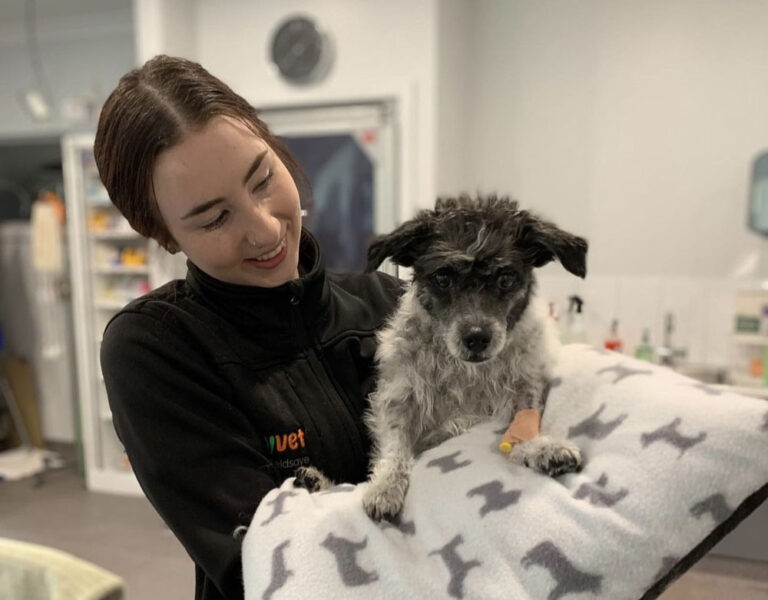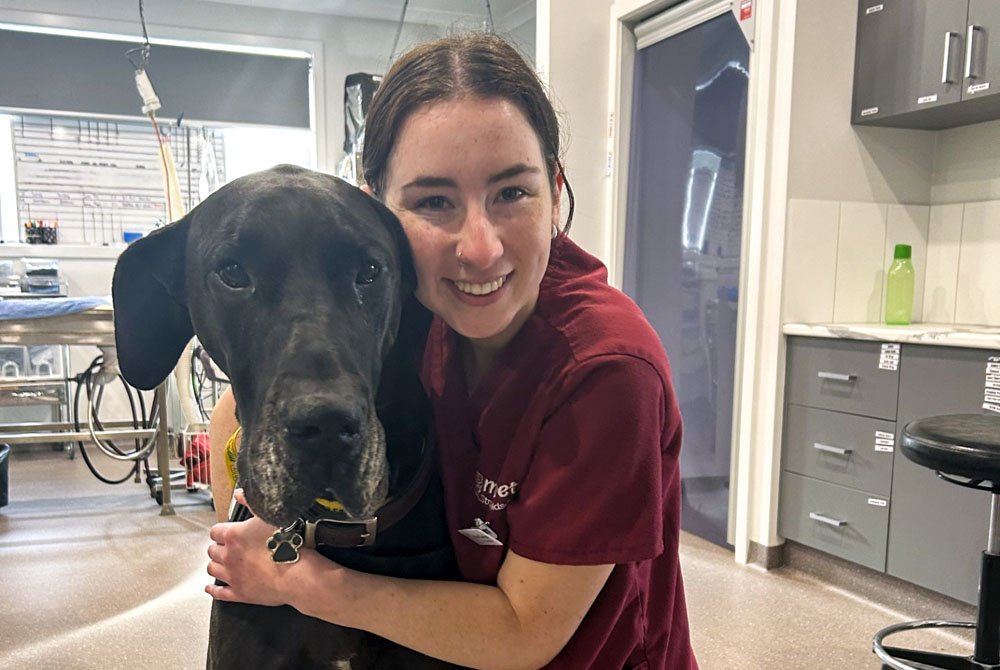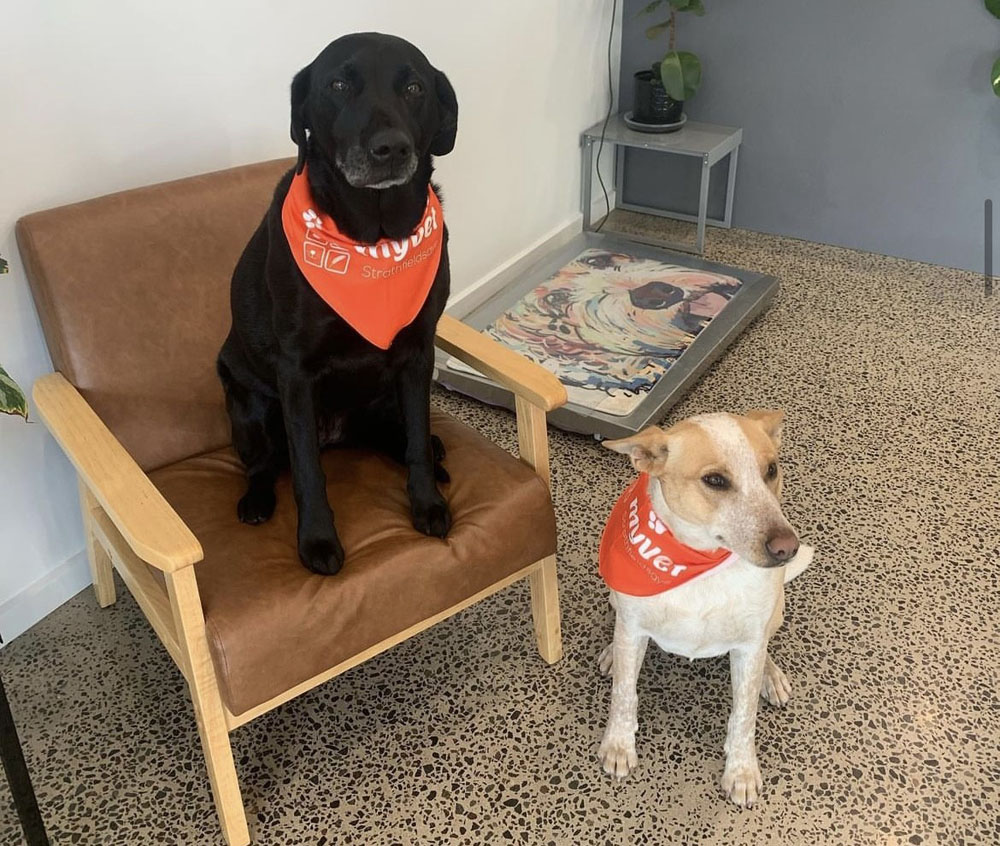Senior Pets
Embracing the Golden Years: Nurturing Your Senior Pet at MyVet Strathfieldsaye
Our animal companions bring us unconditional love, laughter, and countless cherished memories. As they age, their needs evolve, and providing them with exceptional senior pet care becomes paramount. At MyVet Strathfieldsaye vet clinic, we understand the unique challenges and joys associated with caring for an ageing pet. We understand the importance of senior pet care and are here to address your concerns to ensure your beloved friend enjoys a golden age filled with comfort, quality of life, and unwavering love.

Book your Senior Pet in Today at MyVet Strathfieldsaye
Embracing the Uniqueness of Senior Pet Care:
Senior pet care is not simply an extension of their younger years’ routine. Ageing brings physiological and cognitive changes that necessitate a tailored approach. Addressing these specific needs through regular check-ups, preventive measures, and adjustments to their daily life ensures a comfortable and fulfilling golden age.
Identifying the Senior Years:
The onset of seniority varies amongst species and breeds. Generally, dogs and cats enter their senior years around age 7, while larger breeds may transition earlier. Understanding your pet’s specific timeline empowers you to plan and initiate proactive senior care effectively.
Common Challenges Faced by Senior Pets:
As with humans, ageing pets encounter various health concerns. Some common issues include:
- Arthritis: Joint inflammation causing pain and mobility challenges.
- Dental problems: Increased risk of tooth decay, gum disease, and oral health issues.
- Cognitive decline: Changes in behaviour, memory, and awareness.
- Kidney disease: Reduced kidney function requiring attentive monitoring.
- Vision and hearing impairments: Gradual loss of sensory functions impacting their interaction with the world.
Regular veterinary check-ups are crucial for early detection and management of these age-related concerns, promoting a longer and healthier senior life.

Creating a Supportive Home Environment:
Adapting your home to accommodate your senior pet’s evolving needs demonstrates your love and enhances their daily comfort. Consider incorporating:
- Plush, supportive beds: Orthopaedic beds offer joint support and alleviate discomfort.
- Ramps or steps: Assist pets with navigating furniture and accessing favourite spots.
- Improved lighting: Brighter surroundings aid pets with vision impairments.
- Easily accessible water bowls: Encourage hydration crucial for kidney health.
These simple adjustments significantly improve your senior pet’s quality of life and minimise potential hazards.
Nourishing your Pet Body and Mind:
Dietary adjustments are often necessary for senior pets. Considerations include:
- Balanced nutrition: Senior-specific diets cater to their changing nutritional needs.
- Joint support supplements: Glucosamine and chondroitin can help maintain joint health.
- Weight management: Monitor and adjust portion sizes to prevent obesity.
- Hydration emphasis: Ensure easy access to fresh water throughout the day to support kidney function.
Our veterinarians will collaborate with you to create a personalised diet plan that optimises your senior pet’s health and well-being.
Prioritising Regular Animal Check-ups:
Senior pets benefit from more frequent veterinary visits, typically every six months. These check-ups enable early detection of health issues, allow for adjustments to their care plan, and provide opportunities for preventive measures like vaccinations and parasite control. Proactive senior pet care starts with consistent check-ups.
Maintaining Pet Oral Health:
Pet dental care becomes even more crucial for senior pets. Regular dental check-ups, professional cleanings, and at-home dental care routines are essential components of senior pet care. By addressing oral health issues like tooth decay and gum disease, you can prevent discomfort, infection, and potential health complications.
Monitoring Weight and Activity:
Keeping a watchful eye on your senior pet’s weight is essential. Regularly weigh them at home or during vet visits, as weight changes can signal underlying health concerns. Observe their activity levels, noting any significant decreases in mobility or enthusiasm. Our team can guide you on maintaining a healthy weight and promoting appropriate activity levels for your pet’s age and abilities.

Nurturing Their Mental Well-being:
Mental stimulation and engagement are crucial for your senior pet’s cognitive health. Include:
- Interactive toys and puzzles: Challenge their minds and keep them mentally active.
- Regular interaction and playtime: Dedicate quality time to prevent boredom and isolation.
- Calming and familiar spaces: Create cosy areas for relaxation and comfort.
- Gentle exercise: Encourage low-impact activities suitable for their physical limitations.
By stimulating their minds and engaging them in enriching activities, you contribute significantly to your senior pet’s overall well-being.
Navigating End-of-Life Care:
Making end-of-life decisions for your beloved pet is an emotionally challenging yet deeply personal choice. Consider this option when your pet experiences significant pain, discomfort, or a decline in quality of life that cannot be effectively managed. Speak with our Bendigo vet clinic to understand your options.
Book online your senior pet checkup or call 03 5439 5066
FAQS
Senior pet care is distinct due to the specific needs and challenges that arise with ageing. It is crucial for maintaining your pet’s health, comfort, and quality of life during their golden years. Senior pets may experience changes in mobility, energy levels, and overall health, making regular veterinary check-ups and tailored care essential for addressing age-related issues.
The classification of a pet as a senior varies depending on factors such as species and size. In general, dogs and cats are considered seniors around the age of 7. Larger breeds may enter their senior years earlier than smaller breeds. Understanding when your pet reaches this life stage allows for proactive senior pet care planning.
Common health issues in senior pets include:
- Arthritis: Joint inflammation causing discomfort.
- Dental Problems: Tooth decay, gum disease, and oral health issues.
- Cognitive Decline: Changes in behaviour, memory, and awareness.
- Kidney Disease: Reduced kidney function.
- Vision and Hearing Impairments: Gradual loss of sensory functions.
Regular veterinary check-ups are crucial for early detection and management of these issues.
Adapting your home for a senior pet involves considerations such as:
- Comfortable Beds: Provide orthopaedic beds for joint support.
- Ramps or Steps: Assist pets with mobility challenges.
- Improved Lighting: Adequate lighting for pets with vision impairments.
- Accessible Water Bowls: Easy access to water to encourage hydration.
These adaptations enhance your senior pet’s daily life and minimise potential hazards.
Dietary adjustments for senior pets may include:
- Balanced Nutrition: Ensure diets cater to ageing nutritional needs.
- Joint Support Supplements: Supplements like glucosamine for arthritis prevention.
- Weight Management: Adjust portion sizes to maintain a healthy weight.
- Hydration Emphasis: Encourage water intake for kidney health.
Consult with the MyVet Strathfieldsaye veterinary team to create a customised diet plan for your senior pet.
Senior pets benefit from more frequent veterinary check-ups, typically every six months. These visits allow for early detection of age-related health issues, adjustments to their care plan, and preventive measures to enhance their quality of life. Regular check-ups are essential for proactive senior pet care.
Yes, dental care becomes increasingly important for senior pets. Dental problems are common in ageing pets, and oral health issues can impact their overall well-being. Regular dental check-ups, professional cleanings, and at-home dental care are vital components of senior pet care to prevent tooth decay, gum disease, and related health concerns.
Regularly monitor your senior pet’s weight by weighing them at home or during veterinary visits. Changes in weight can indicate health issues. Track their activity levels and note any significant changes, such as decreased mobility or lethargy. Our veterinary team can provide guidance on maintaining an optimal weight and promoting healthy activity.
Supporting your senior pet’s mental health involves:
- Enrichment Activities: Provide mentally stimulating toys and puzzles.
- Regular Interaction: Spend quality time with your pet to prevent isolation.
- Comfortable Spaces: Create cosy areas for relaxation.
- Gentle Exercise: Encourage light exercise suitable for their age.
Mental stimulation contributes to your senior pet’s cognitive well-being.
Deciding on end-of-life care for a senior pet is a personal and challenging choice. Consider end-of-life care when your pet experiences significant pain, discomfort, or a decline in quality of life that cannot be effectively managed. Our compassionate veterinary team is here to support you through this difficult decision, providing guidance and care when needed.
